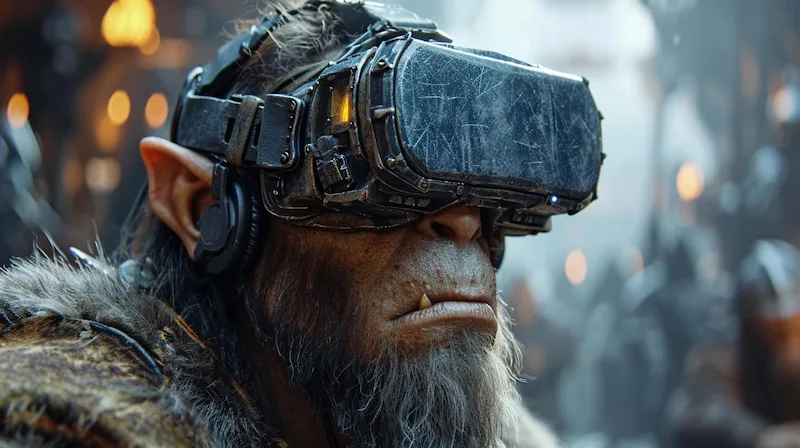As we step into 2024, the video game industry continues to evolve rapidly, with emergent trends shaping the future. In this article by the 1D3 Marketing Strategist Romans Kozlovkis, we explore these video game industry trends, backed by data and insights from leading sources. While these insights are predictive, they offer a glimpse into an exciting and dynamic future in gaming.
Modest Growth Amidst New Challenges
The global video game industry, while still growing, faces new economic challenges. A projected growth of around 2.5% indicates a more mature market navigating through global economic complexities, including inflationary pressures
This modest growth trajectory suggests a competitive environment where innovation is key. Key drivers include the expanding user bases of the Xbox Series and PlayStation 5, along with the sustained popularity of live-service games and back catalogue sales.
THE MOST COST-EFFECTIVE MERCHANT OF RECORD SERVICE FOR VIDEO GAMES
LEARN ABOUT 1D3 DIGITECHVR Dominance and Immersive Gaming

The VR market has been showing consistent growth, with the global VR gaming market size expected to expand significantly. Growth will be fueled by technological advancements like cloud-based processing, volumetric VR and high-fidelity displays, along with cost reductions and increased content availability. Driven by these factors, the VR gaming segment could witness a compound annual growth rate of over 30%
With new VR headsets like Meta Quest 3 and Apple Vision Pro and an expanding library of immersive games, VR is becoming more mainstream, offering unprecedented levels of engagement and realism.
AI and Machine Learning

AI and machine learning are not just creating smarter NPCs but also revolutionizing game development and player personalization. The use of AI in game development is expected to enhance player engagement and retention rates, as well as reduce development costs in the long term.
While revolutionary, the integration of AI in video game development presents several challenges and negatives that are important to consider:
- Creative Control: AI might produce unexpected results, challenging the developers' creative intent.
- Ethical Concerns: AI use raises data privacy and ethical issues in games.
- Content Homogenization: AI risks creating repetitive and less innovative game content.
- Resource Intensive: Implementing AI can be complex and costly, especially for smaller studios.
- Job Displacement: AI's capabilities could lead to reduced human roles in game development.
Despite AI's prominence in the industry, it is still too soon to discount the importance of human roles in game development and operations. Only 20% of gaming industry executives believe that generative AI will reduce costs, and most do not expect it to significantly alleviate the industry's talent shortage. This indicates that while AI may bring efficiencies and advancements in game development, it is not seen as a comprehensive solution to the financial and workforce challenges
New Nintendo Console Release

Anticipating the release of a successor to the Nintendo Switch, possibly "Switch 2," Nintendo is set to excite the market.
This new console, likely to be accompanied by a new 3D Mario game, will enhance Nintendo's digital storefront model, allowing users to transfer accounts and game libraries. Speculation suggests that Switch 2 will hit the stores in September 2024 with two models priced at 449$ and 400$.
The success of the original Nintendo Switch suggests that the "Switch 2" will generate significant market interest, competing directly with major gaming consoles and influencing the handheld gaming segment.
Xbox's Strategic Move to Mobile
Microsoft is actively working on a mobile storefront for Xbox. This move is part of a broader strategy to extend the joy and community of Xbox gaming beyond consoles, bringing it into the highly lucrative mobile world. The development of this platform signals Microsoft's intention to tap into the mobile gaming market, which is currently dominated by Apple and Google. This move is partly influenced by the EU's Digital Markets Act, which mandates platform holders to accommodate third-party app stores.
The mobile storefront is poised to revolutionize how games are accessed and played on mobile devices. This ambitious project is not just a fleeting endeavour but a significant part of Microsoft's long-term strategy in the gaming sector.
Epic Victory: Shaking Up the App Store Monopoly
Epic Games' landmark legal victory against Google marks a seismic shift in the app ecosystem, particularly impacting the gaming industry.
This ruling challenges the long-standing dominance of major app stores, paving the way for alternative platforms and potentially lower fees, which could significantly boost developer profits. It also sets a critical precedent for antitrust scrutiny, signalling a possible end to the monopolistic practices of tech giants and empowering developers with greater autonomy.
This shift promises to foster innovation and diversity in app development, while consumers could benefit from a broader range of apps and competitive pricing. The outcome of this case could reshape the digital marketplace landscape, making 2024 a pivotal year for both developers and tech giants.
The Challenges of Gaming Subscriptions in 2024
The gaming subscription market is on the rise, projected to double its revenue share by 2027, yet it faces strategic challenges.
As it currently accounts for just 4% of total gaming revenues, with the majority coming from in-game transactions, companies must balance the allure of high-budget AAA titles against the predictable income from subscriptions.
Major players like Xbox Game Pass and PlayStation Now are intensifying competition, signalling a shift towards a more dynamic and diverse gaming landscape. This growth trajectory, however, hinges on how companies strategically adapt to evolving consumer preferences, balancing in-game purchases with the benefits of subscription models, all while fostering player engagement and loyalty in an increasingly competitive market.
Strategic Moves: The Escalating Trend of Video Game Mergers

The trend of acquisitions and consolidation continues in 2024, driven by major players like Tencent, Sony Interactive Entertainment, and Savvy Games Group. Following Microsoft's Activision-Blizzard buyout, these mergers underscore the importance of scale and integration for success in the industry.
While providing growth opportunities, this trend also presents challenges for independent publishers in a competitive market.
Conclusion
As we look at the video game industry trends of 2024, it's evident that we're in the midst of a significant transformation. The integration of VR and AI in gaming is more than just a technological evolution; it represents a fundamental shift in the gaming experience, offering unprecedented levels of immersion and new challenges in creativity and ethics.
Furthermore, developments like Microsoft's move into mobile gaming and Epic Games' legal victory signal a restructuring of traditional market dynamics, fostering new competition and growth opportunities. These trends paint a picture of an industry that is not only adapting to current demands but is also strategically preparing for future challenges and opportunities.





